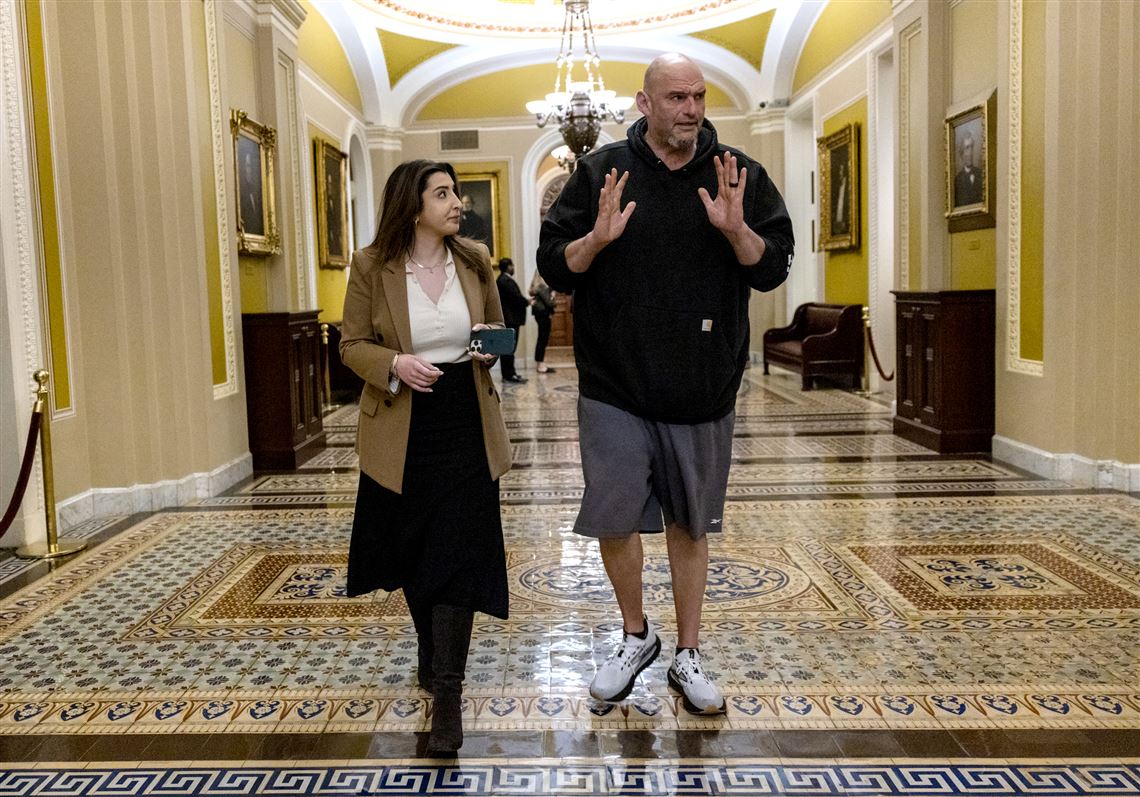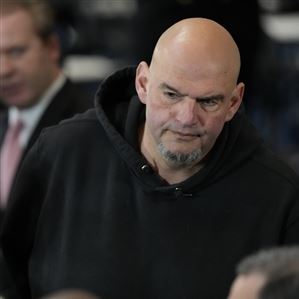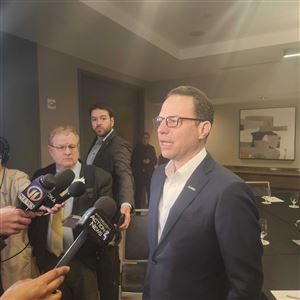WASHINGTON — With President Donald Trump's torrent of major policy changes sparking protests from the House chamber floor to Downtown Pittsburgh, Gov. Josh Shapiro and U.S. Sen. John Fetterman say they remain focused on getting things done for Pennsylvanians.
But how they’re navigating Trump’s second presidency puts the spotlight on their personal and political differences as Pennsylvania’s top Democrats in state and federal office, and as high-profile names often thrown into speculation on the 2028 presidential race. It also reflects the challenges Democrats face amid a Republican stronghold, for now, over all three branches of the federal government.
Mr. Shapiro — tapped by Trump to join the bipartisan Council of Governors — has said he’d seek common ground with the administration but has delivered polished critiques of the president’s push for tariffs, which he says will hike prices in Pennsylvania. And he sued the administration after federal funds for critical programs were temporarily frozen.
Mr. Fetterman — the lone Democrat to meet Trump at Mar-a-Lago before the president took office — has stood out for backing Cabinet nominees, pressing for stronger border policy, cosponsoring legislation to make it easier to detain and deport migrants charged with theft-related crimes, and urging Democrats to craft a political message that isn’t focused on painting Trump as a fascist.
The former Braddock mayor and lieutenant governor has also made a point of embracing bipartisanship with his new counterpart, Republican Sen. Dave McCormick.
Mr. Fetterman has largely steered clear of sharp critiques of the administration, except for its open attacks on transgenderism, and a spat on X with Elon Musk over chaos caused by funding freezes and firings instigated by the Department of Government Efficiency.
Mike Butler, a Democratic strategist in Pittsburgh, said he wasn’t surprised by Mr. Fetterman’s and Mr. Shapiro’s reactions to Trump's second stint in the White House — with the governor being a more polished politician and the senator more of a "maverick" when it comes to political views and how he approaches constituencies.
But the dynamic also stems from the roles of each office.
"The governor already always kind of has a little bit more freedom to roam than a senator does," Mr. Butler said. "A senator really wants to get a lot of legislation through ... [and] you're one of 100 as opposed to one of one."
Mr. Fetterman responded to Trump’s adversarial address last week to a joint session of Congress by attacking his own party — namely progressives who shouted at the president, waved signs (including Rep. Summer Lee), walked out or were booted by the House sergeant at arms.
“A sad cavalcade of self owns and unhinged petulance,” Mr. Fetterman posted on X. “It only makes Trump look more presidential and restrained.”
When reporters asked Mr. Shapiro on Wednesday what he thought of Trump’s address, the governor leaned back from a microphone and almost rolled his eyes with a grin.
“I get that there’s a lot of pomp and circumstance to these things, and I celebrate that,” he said. “I think it’s important that a president address the nation. I also think it’s important that a president tell the truth, which we didn’t hear a whole lot of truth-telling last night. But beyond the sort of rhetoric and showmanship, I’m really far more focused on the concrete things this administration does every day.”
The governor touted his efforts to work with Republicans and Democrats in the General Assembly to reduce costs and cut taxes for businesses. He said Trump’s proposed tariffs on Canada and Mexico — the state’s two largest trading partners — would jack up prices of goods and services and hurt Pennsylvania farmers and businesses. And he launched an initiative that could help laid off federal employees with various specialties fill more than 500 critical vacancies.
“He’s picked his spots smartly,” he said. “He’s been measured in his criticism but hasn’t shied away from suing him. He’s shrewdly maneuvering in a challenging political environment.”
Mr. Butler said the governor and senator also may be responding differently to the Trump administration because of the constituencies that have helped send them to Harrisburg and Washington.
Mr. Shapiro has found success in ways similar to former President Barack Obama — more affluent, suburban, college-educated voters, especially in the collar counties around Philadelphia. Mr. Fetterman has typically gone into more rural, industrial communities, which have historically trended red, to court old-school, working-class Democrats, he said.
"I think they're both being responsive to their supporters that kind of propelled them to victory — the ones that kind of are the difference makers in their political constellation," Mr. Butler said.
‘Find a way forward’
Republicans on Capitol Hill have almost universally praised Trump.
Some, like Kentucky Sen. Rand Paul, warn that tariffs could undercut the backbone of his state’s industries, with business leaders telling him it will raise prices for bourbon, cars and homes.
Others, including Rep. Brian Fitzpatrick, R-Pa., have subtly or overtly questioned Trump’s overhaul of foreign policy and his attacks on Ukrainian President Volodymyr Zelenskyy as he praises Russian President Vladimir Putin.
But Mr. McCormick and Western Pennsylvania members of the House have applauded Trump’s targeting of diversity initiatives, efforts to reduce spending, and pushes for better trade deals and peace in Europe.
Mr. McCormick recently told the Post-Gazette that Trump campaigned on “shaking up Washington, reducing the budget ... reining in the bureaucracy in terms of rogue bureaucrats driving regulation and … progressive ideology that has hijacked some of the institutions.”
“That was the promise,” he said. “And I think what DOGE and Elon Musk are doing is trying to deliver on that promise.”
Still, even Mr. McCormick said the administration “can’t do dumb things.”
“You can’t cut things that ultimately are critical to lifesaving support or that would undermine our key strengths and research,” Mr. McCormick said. “So as we learn about some of the consequences of some of the big moves, people can be nimble and adjust. I think that’s what’s happening, and that’s what we have to monitor.”
A handful of Republicans have reportedly expressed concerns about civil service cutbacks, cuts to the National Institutes of Health, and the firings of veterans at Veterans Affairs, probationary-period FBI agents and Department of Agriculture microbiologists combating the bird flu.
Mr. Fetterman told The Bulwark Podcast this past week that he doesn’t agree with many of the moves by Trump and Mr. Musk, such as broad funding slashes and firings of veterans and other federal workers. His team in a Thursday fundraising email said, “with Medicaid, Social Security and other critical programs set to be cut under the House GOP budget, we need to show Republicans this isn’t what people voted for.”
He told The Bulwark that he hopes Republicans lose control of the House in 2026. But he suggested Democrats won’t win elections if they follow the example of “that jerk off” Rep. Joe Wilson of South Carolina, who shouted “you lie” during a 2009 State of the Union address by former President Barack Obama.
“What I witnessed wasn’t helpful and that wasn’t moving the ball for Democrats,” he said, noting he lives in an increasingly “purple” state and is trying to find a way forward for the party. He added that if ”you yell at everything” — every time one disagrees with Trump or Republicans — “then everything just becomes absurd.”
Charlie Gerow, a Harrisburg-based Republican strategist, said Mr. Fetterman has become “the voice of reason within the Democratic Party.”
“He clearly understands that the nonsense that went on Tuesday night hurts their brand very badly,” he said.
Ms. Lee, D-Swissvale, was among the Democratic lawmakers holding up black signs reading “false” or “Musk steals.”
“Your government is not more efficient,” she said in a video before the speech. “Your government is a national security threat right now.”
U.S. Rep Chris Deluzio, who’s in a more competitive district, did not hold a sign. Sitting a few rows behind Ms. Lee, Mr. Deluzio, D-Aspinwall, often sat stone-faced with his arms crossed or appeared to be on his phone during the speech. But he was among the few Democrats who stood while applauding the return of teacher Marc Fogel, the Butler native who used to teach in Oakmont in Mr. Deluzio’s district and whom the Trump administration helped get released from Russia after three years of wrongful detainment.
Earlier in the week, Mr. Deluzio urged lawmakers to “take on corporate power to lower costs.” While that message has been a mainstay for Democrats in recent years, including former Sen. Bob Casey, Mr. Deluzio on Friday offered party introspection that mirrored some of Mr. Fetterman’s criticism of Democrats — but he focused on tariff policy.
The congressman urged Democrats to rethink “anti-tariff absolutism.” He said he and many of his constituents support small tariffs, especially when they target China.
“I’m a Rust Belt Democrat from swingy Western PA — where lousy trade deals like NAFTA stripped us for parts,” he said. “Democrats need to break free from the zombie horde of neoliberal economists who think tariffs are always bad. President Trump’s tariff approach has been chaotic and inconsistent … But the answer isn’t to condemn all tariffs. That risks putting the Democrats even further out of touch with the hard-working people who used to be the lifeblood of the party.”
Minnesota Gov. Tim Walz, however, called out Mr. Fetterman’s criticisms in an interview with CNN, saying he “totally” disagreed despite being friends with the senator.
“Did he listen to the unhinged nature of the things that were being put out?” the Democrat said of Mr. Fetterman. “I don't know, the count stopped at 60 falsehoods, misrepresenting and cheering an unelected, richest man in the world as he decimates the VA system.”
‘Weak hand’
Mr. Fetterman’s office did not immediately respond to a request for comment. The governor’s office told the Post-Gazette that Mr. Shapiro is focused on his job and results — not political commentary.
Despite their different styles, both Mr. Shapiro and Mr. Fetterman have touted bipartisanship. And they’ve delivered at least one similar core message on Trump: They’ll work with the administration when it can help Pennsylvania, and speak out when Pennsylvanians are negatively impacted.
In August, as Mr. Shapiro was in the mix for potential Democratic vice presidential nominees, Mr. Fetterman denied reports that he or his staff sought to undercut the swing-state governor’s chances.
Earlier this month, comedian and commentator Bill Maher told his HBO “Real Time” audience that Mr. Fetterman should top the Democrats’ 2028 presidential ticket.
“Voters aren’t really savvy about the issues, but they have made it clear what is important to them — authenticity, balls and charisma,” he said. “Trump has that package and so does Fetterman.”
Other Democrats, such as Connecticut Sen. Chris Murphy, say the party should be more aggressive in fighting Trump.
Known for bipartisan deals on gun safety and immigration, Mr. Murphy recently told the New York Times the Democratic brand is “fundamentally broken.” He’s pushed Democrats to act like a true opposition party — saying they shouldn’t back any Cabinet members or Republican-led legislation. In his frequent Instagram and Facebook posts he accuses Trump and Mr. Musk of spouting lies and implementing a “billionaire takeover.”
Mr. Balaban said he could think of at least 15 reasons Mr. Murphy is more outspoken against Trump: that’s about the number of percentage points former Vice President Kamala Harris beat Trump by in Connecticut — compared to a 1 percentage point loss for Ms. Harris in Mr. Fetterman’s home state.
“It’s a challenging situation for all Democrats in Washington,” he said. “There’s not a lot they can do … to stop Trump’s executive actions. It doesn’t mean they can’t do anything, but they’re playing with a weak hand.”
First Published: March 9, 2025, 9:30 a.m.
Updated: March 10, 2025, 1:36 p.m.























